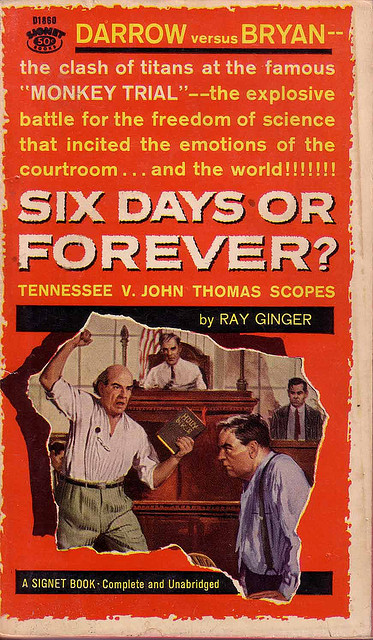
While rereading Ray Ginger’s Six Days or Forever? Tennessee v. John Thomas Scopes (1958) recently, I was struck by what even I considered to be a plethora of unusual, obscure, and confabulated words in the book. This isn’t intended as a criticism of the book: it’s highly readable, perhaps because Ginger worked as a journalist before entering academia. But the recherché vocabulary is certainly a noteworthy feature. In part 1, then, I offered brief definitions of the first ten of the twenty-five words that I thought were especially unusual—“Adullamites,” “autochthonous,” “blandished,” “cenoby,” “corybantic,” “daddy-ridden,” “diaphanous,” “dread-bin,” “eupeptically,” and “fardel”—and now I’ll do the same for the remaining fifteen.
febricant: “Darrow’s febricant questions began again” (p. 168). “Febricant” means “producing fever” (although the word is missing from the Oxford English Dictionary). The adjective is quite appropriate, since these questions were posed to Bryan, who unwisely took the stand to testify about the Bible.
filiopiety: “In a convulsion of filiopiety, men tried to deny the present by asserting a fugitive and monastic virtue” (p. 10). As the two halves of the word suggest, filiopiety is the sort of reverence that it’s appropriate for sons to have for their fathers, and by extension their forebears. So ancestor worship (and compare “daddy-ridden” in part 1).
fleered: “[Bryan] flushed at some questions, fleered at Darrow because of others” (p. 168). To fleer is to laugh or smile contemptuously; the alliteration with “flush” is appealing. “Fleer” is common in Shakespeare: in Much Ado About Nothing, e.g., Leonato tells Claudio, “Tush, tush, man; never fleer and jest at me: / I speak not like a dotard nor a fool.”
hogma: “In theology also, Bryan lived high on the hogma” (p. 37). A portmanteau of “hog” and “dogma,” obviously; in the previous sentence, Ginger quoted a description of a gargantuan breakfast (including “a formidable slice of ham”) that Bryan consumed in 1900 while running for president. A porcine reference, like “masty” below.
masty: “The next evening William Jennings Bryan … swept through Nashville with his masty physique and his silver voice” (p. 5). “Mast” refers to the nuts of forest trees, such as acorns, apparently, and so “masty” describes anything fed on mast—such as pigs. This is not the only time that Ginger employs a porcine adjective while discussing Bryan.
multifoliate: “From such roots sprang a multifoliate plant” (p. 10). From context, it’s clear that “multifoliate” means having many leaves. Unless he encountered it in a botanical context, I wager that Ginger remembered it from T. S. Eliot’s “The Hollow Men,” which borrows a “[m]ultifoliate rose” from Dante.
propaedeutic: “‘Now,’ [Darrow] urged his propaedeutic, “that is plain enough, isn’t it?” (p. 144). A propaedeutic is a preparatory or introductory treatment. Ginger uses the term as he describes Darrow’s condescending exchange with Judge Raulston, culminating with remarks that almost led to the court holding Darrow in contempt. (He apologized.)
reticular: “Darrow arrived, playing his role to the limit, clearly amused, thinning hair drooped across his reticular forehead …” (p. 93). The Latin word for “net” is “rete”; so Darrow’s forehead resembled a net or a network. For my money, “furrowed” or “wrinkled” would have been preferable.
rowel: “Darrow, his mouth raw from repeated curbing, jumped under Stewart’s rowel” (p. 142). A rowel is the spiky part of a spur, so the word continues the equestrian metaphor of the curb attached to the bit in Darrow’s mouth. Perhaps the terms weren’t as obscure (to all but the horsy set) back in 1958, when Six Days or Forever? was published.
scurf: “Alert to any trace of scurf on the student soul, [Bryan] publicized the report of a religious paper, based on a survey” about student religiosity, gambling, and drinking (p. 30). Literally, flakes on the skin, like dandruff, so perhaps “smudge” would have been a better choice of words—but Ginger doubtless wanted to make light of Bryan’s concerns.
sodality: “John Randolph Neal suggested that Stewart should also apologize for having called Darrow an ‘agnostic,’ but the attorney-general wouldn’t make the sodality so catholic as that” (p. 117). From a Latin word for “fellow,” a sodality is “a society, association, or fraternity of any kind,” says the Oxford English Dictionary.
squires: “Three days later [Scopes] had a preliminary hearing before three squires” (p. 20). Citizens. Frederick Law Olmsted used the term “Tennessee squire” in 1860 to refer to a slovenly and indolent farmer, but the term was rehabilitated: in 1956, the Jack Daniel’s company launched the Tennessee Squire Association to honor friends of the distillery.
tessera: “The whole body of Scriptural ethics is … a mosaic in which some tessera are lovely, others deformed, some moral, others loathsome” (p. 237). The context makes it clear, although Ginger erred with regard to the number: a tessera (singular) is a tile in a mosaic. The plural is “tesserae” (although I wouldn’t object to “tesseras” myself).
uncurried: “An Uncurried Mind” (p. 43; the title of chapter 3). Ginger is describing Darrow, and his point is not that Darrow’s intellect was not redolent of turmeric, cumin, and mustard, but that “[t]he grooves in his mind” were not tamed by “the tines of usage and custom”: Darrow’s mind was uncurried by a currycomb.
wroth: “[Bryan] was wroth at the ‘scientific soviet’ that was trying to control the schools” (p. 40). Ginger doubtless chose the archaic “wroth” rather than “wrathful” or even “angry” to suggest the obsoleteness of Bryan’s attitude to modern science—although quoting the term “soviet,” which entered English around 1917, undercuts the effect.

